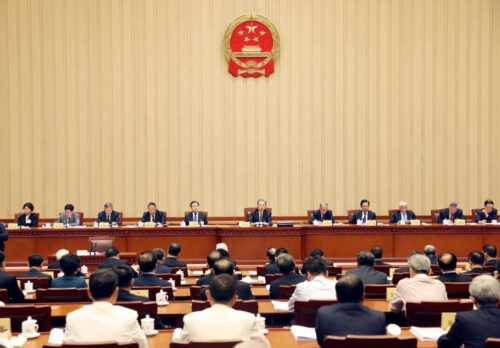How to understand China’s notoriously dodgy economic statistics in 2022
China’s GDP numbers and other official stats are no longer completely made up, but just how reliable are they?

If there was ever a year when politics was likely to skew China’s notoriously dodgy economic statistics, 2022 is it. Beijing’s COVID-zero policy has squelched vast amounts of business activity, even as President Xí Jìnpíng 习近平 reportedly has told top finance officials to ensure the country grows rapidly and doesn’t lag behind the U.S. (The IMF predicts U.S. GDP will grow 3.7%.) It is also a year of high sensitivity with Xi expected to announce he is staying on for an unprecedented third term at a quinquennial Party congress in the fall. So when China’s statistical bureau announced that GDP grew by a surprisingly strong 4.8% in the first quarter even as COVID restrictions forced companies to close, consumers to stop spending, and as unemployment for youth soared to 18.2%, many economists shrugged it off as meaningless.
“Real GDP has always been a useless number to track. We see it is still useless,” says Andrew Polk, a founding partner of economic research house Trivium China.
Some 25 years after China jettisoned its old Soviet-style planning era economic counting system and announced it was entering the modern world of fact-based statistics, huge questions remain about the veracity of Chinese economic indicators. A legacy of five-year plans that has lasted until today and a tendency to set targets for everything from non-performing loans to emission reductions puts pressure on local authorities to fudge numbers. Accurate retail spending and income figures are hindered by incomplete household surveys. The unemployment gauge is seen as virtually meaningless as, in most cases, it doesn’t count migrant workers who make up a significant part of the workforce.
The fact that China reports its quarterly GDP data — which involves gathering a tremendous amount of data each time — only about two weeks after the end of every third month, much earlier than in most other countries, hasn’t helped to give observers confidence in the numbers. For many analysts, China’s headline numbers are as much aspirational figures signaling government intention as they are believable. “I don’t think the statistics bureau is independent from the government — it is up to the leadership to decide what they want in terms of GDP numbers,” says Gān Lí 甘犁, an economist at the Southwestern University of Finance and Economics in Chengdu, Sichuan, who also runs one of China’s largest independent household surveys.
China’s accounting of its economy has come a long way since the dark days of the Great Leap Forward (1958–62). Then efforts to meet Máo Zédōng’s 毛泽东 unreachable steel production targets led to the tragedy of widespread famine. But official concerns about the quality of China’s statistics reporting have continued long into the modern era.
That explains the rise of alternative gauges, such as the so-called “Lǐ Kèqiáng 李克强 Index,” which measures bank loans, rail cargo volume, and electricity consumption and is named after the then future premier, who as Party secretary of Liaoning Province in 2007 reportedly called China’s statistics “man-made” and “for reference only.” China economy watchers, including investment banks, have developed multiple data sources to track the economy, including public information released by provincial-level stats bureaus, industrial associations, and universities, as well as private surveys released by companies like ecommerce giant Alibaba. “We look at high-frequency daily indicators,” including property sales and traffic congestion, to come up with more accurate numbers, says Andrew Batson, the research director at Beijing-based consulting firm Gavekal Dragonomics. “It is a constant cross-check,” says Trivium’s Polk, who says he sees credit growth as the most important way to gauge overall growth.
The Chinese government has also been working to improve the counting of its economy. More data is now reported directly to Beijing, rather than first going through local government officials who might be prone to inflate them. The National Bureau of Statistics (NBS) has tried to standardize reporting systems from China’s various industrial associations and ministries. And the bureau has worked with international organizations such as the International Monetary Fund, the Organization of Economic Cooperation and Development, and the United Nations to try to upgrade its information gathering and measuring. China even won kudos in 2020 when it announced it would break with a decades-old practice and not set a GDP target that year. That decision was seen in part as an effort to reduce political pressures on local governments to juice growth during the COVID crisis, and described by the official Xinhua News Agency as “a wise, farsighted, and responsible decision to cope with complicated domestic and global situations.” (That didn’t last and China resumed its annual target setting the following year.)
Today, the NBS is most often accused of smoothing out troughs and peaks, as it likely did during the 2008 global financial crisis; that still allows analysts to detect trend lines even if they don’t trust the exact figure. The fact that statistical communiques commonly credit economic achievements as happening “under the strong leadership of the Central Committee of the Communist Party of China with comrade Xi Jinping as its core” is a constant reminder that statistics are considered of serious political importance. But the idea that numbers are outright being made up, rather than padded a bit on the side, is not believable, argues Calla Wiemer, an economist who has studied China’s statistics system and worked as a foreign adviser to the NBS some two decades ago. “GDP figures rest on a vast complex of interlocking numbers. It would be a formidable task to systematically distort them,” Wiemer says.
The reality is that China’s number counters do not have an easy task. While the NBS continues to be very good at counting widgets, or measuring overall industrial production, a legacy of the country’s planned economy past, it struggles to count domestic consumption and services that now contribute the most to GDP, and both of which are growing in importance. That is in large part because it still falls short in the frequency and skill with which it uses the key statistical counting tool of household surveys, meaning it does badly in recording people’s income, wealth, and consumption, says Gavekal’s Batson. And a perennial source of concern is how China determines the GDP deflator — a way of coming up with an accurate figure that takes into account changing prices. “This is where most of the dodginess happens,” says Batson. “They don’t tell you how they calculate it.”
Local authorities still face tremendous pressure to meet official targets; even with the abandonment of a planned economy, China’s top-down, target-rich, five-year-plan method of economic policy making continues to skew reporting toward meeting goals rather than accurate counting. “The government always wants to promote and prioritize something and people are always trying to meet those targets,” says Batson. “If I were a private entrepreneur, and wanted to please the local Party secretary, I would report whatever information he wanted to hear. Or if it’s a state-owned enterprise that has some plan to fulfill, it can report those numbers that show it is fulfilling it,” says Carsten Holz, a professor at Hong Kong University of Science and Technology and the author of an influential 2007 article titled “Have Chinese scholars all been bought?” that described China’s statistics as coming with “a large question mark.”
There are already clear signs this year that China’s leadership won’t tolerate any departure from the officially approved narrative on the economy. At least five well-known economics commentators, including Hong Kong–based economic analysts, a professor, and a business executive, have seen their Chinese social media accounts censored so far this year, and one even ended up out of a job. After writing critically about the COVID-zero policy, as well as making bearish predictions about China’s stock markets and warning of the possibility of capital flight, Hóng Hào 洪灝, the head of research at Bank of Communications International (Bocom), had access to his WeChat account blocked, and his Weibo account with more than 3 million followers was shut down. He then unexpectedly left Bocom last month. (The firm said Hong left for “personal reasons.”)
“In a year like this, politics certainly play a role,” says Gan Li.
For now at least, China’s official stats seem more influenced by political imperatives than economic reality.






